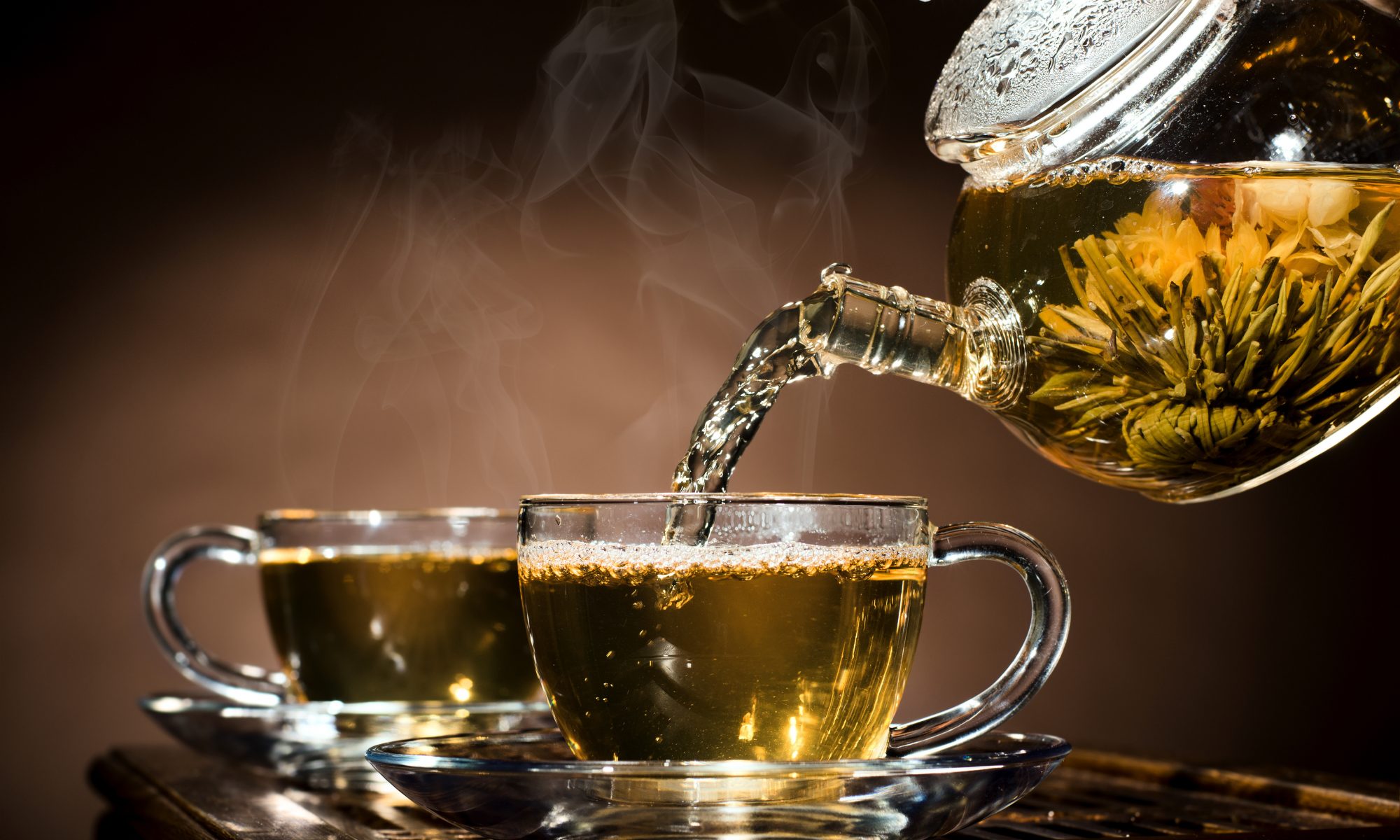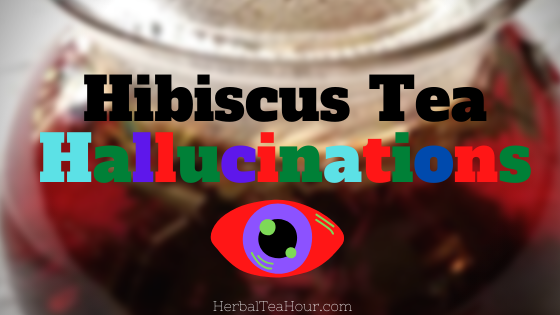HIBISCUS TEA HALLUCINATIONS: INTRO
Skip Ahead To:
We all know that hibiscus tea is awesome – neither you nor myself would be here if that wasn’t the case! Made from the “Hibiscus sabdariffa” species, hibiscus tea is blessed with a lot of health or general wellbeing benefits. However, talks of hibiscus tea hallucinations have abounded.
Any time hallucinations are potentially involved, we want to be sure to take a closer look. Especially when one of our favorite types of herbal teas is involved! Are you brave enough to dive in with us to “see” what we find?!
Hibiscus Tea Hallucinations – Overview

Please note: This post contains affiliate links. An affiliate link means that we may earn advertising/referral fees if you make a purchase through our links.
In this article, I’m going to tell you some interesting facts about hibiscus tea. Then, to clear the air, we’re going to look at hibiscus tea hallucinations and how true that specific claim is (and why so many are choosing to drink their hibiscus tea before bed).
After clearing the air, we’re going to look at a hibiscus tea recipe that I’m positive that you’ll love – I know that I do! We’ll keep this as simple as we can by dividing that section into two parts – it’ll be very easy to follow, so don’t worry.
If you were wondering how you can buy the right hibiscus tea, I’m here to help. It might also help you with your fear of hibiscus tea hallucinations. We’ll talk about the features you should look at before making a purchase! You’ll be able to separate the “good” from the “bad” with ease and efficiency!

Then, finally, I’m going to show my top picks on hibiscus tea products. I’ve used them before and I can guarantee that they’re just awesome. Oh, there are other good hibiscus tea offerings on the market, but I bet you’ll be persuaded to give the showcased brands a try!
Having said all that, I’m itching to get started! Let’s begin!!
Hibiscus Tea Hallucinations – The Basics

Please Note: As an Amazon Associate, I earn from qualifying purchases.
We all know that hibiscus tea is one of the most popular types of herbal tea around the world. But did you know that is in the midst of another boom in its popularity? In most places, it’s known by different names (Jamaica Flower, for instance). The taste and robust aroma combined to make this particular herbal tea very enticing!
Hibiscus tea is also known for its ability to blend perfectly with other leaves. For example, peppermint and spearmint can be blended with hibiscus leaves to create something truly spectacular. The ability to experiment with hibiscus tea is commonly pointed to by those who sing its praises! The possibilities for creation are endless!!

Do you know what the best part of the hibiscus tea is? It’s more than just tea. It’s also alleged to be medicinal in terms of promotion of health and generalized well being!
From weight loss to blood sugar control, it’s the perfect tea for those who want to add natural supplements to their dietary regimen (only after getting permission from your doctor, of course).
While it’s really good, there are side effects of this tea. Taking it in excess can cause issues like low blood pressure. That is what it is so important to speak with your doctor or medical car professional PRIOR to consuming hibiscus tea.

Now, this is the part you’ve probably been waiting for. I can tell you categorically that there is no proof that hibiscus tea hallucination is true. There’s really no evidence to support that particular side effect. There, I said it.
However, we still want to make sure you don’t have any other negative surprises! To make sure you lower your chances of suffering from any side effects, there are several things that you can do.

First, you can make sure that hibiscus tea does not have any additives. Additives are usually added to preserve the tea ingredients – you don’t need these, and your body will thank you for leaving them on the sidelines! Oh, and if your tea has been certified by the USDA organic, that’s even better!

Later on in this article, we’ll look at some countries that produce some of the best hibiscus organic leaves – just so you can get a feel for the regions that are traditionally responsible for such a delicious end-beverage!
But first, let’s prepare our recipe! I picked out a special one – a recipe that has satisfied many a hibiscus tea craving of my own (particularly during the fall and spring seasons, though I am not sure of the reasoning behind those times of the year)!
A Simple Hibiscus Tea Recipe
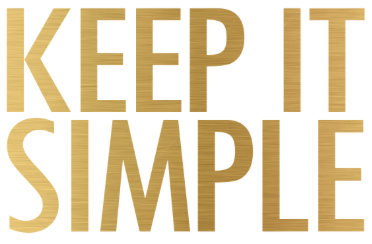
If you are afraid of hibiscus tea hallucinations (I doubt they even exist), then the first thing to do is to make your tea properly. This is a good step in every herbal tea recipe, frankly, but is particularly important if you want to eliminate any potential hallucinogenic downsides!
As always, I’m here to help. As explained earlier, we’re going to divide this section into two parts. First, we’re going to list the ingredients needed. Then, in the second section, we’ll talk more about the instructions.
Are you ready? Let’s fire away!
Easy Listing of Ingredients
- Hibiscus Leaves (the more leaves you use, the more flavor that results) (Look into buying pure leaf hibiscus tea)
- Water (4-10 cups depending on the number of servings)
- Sweeteners (optional) (we like to use sustainably sourced honey)
- Lime (you can use lemon as well, and even orange slices can prove to be a tasty treat)!
Now that we are done with that, let’s take a look at the steps. Calm down, calm down – we go step by step and we keep our instructions very clear and easy to follow. Ok, let’s do it!
Easy to Follow Instructions
Step One. Time to prep the leaves. If you have hibiscus flowers in your house, you’ll have to cut and sift them. Make sure you dispose of them once you are done. It should also be done in a clean environment. One “green” way is to compost them in your garden after you are done!
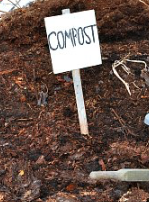
However, if you buy certain hibiscus teas, this step might no longer be necessary. Most good ones are already cut and sifted. I recommend those ones. It reduces the chances of hibiscus tea hallucinations! It also saves you the time and effort and brings you that much closer to the whole “tea drinking” instead of “tea brewing” part!
Step Two. Put water on a stove. Bring it to a boil. Make sure you take necessary precautions when dealing with boiling water to keep from injuring yourself!
Next, reduce the heat and add your leaves. Once the leaves have been added, allow it to simmer.
Step Three. It’s steeping time. This can take between 3-10 minutes. Remember that the longer the steeping time, the stronger the flavor of the tea. However, you don’t need to step for much longer than 10 minutes. Why? There is only so much flavor to be released during the steeping process!!
While steeping, I’d recommend that you keep the pot closed. This traps the moisture and produces a more robust aroma. You should not be surprised when this aroma begins to fill your house with the rewarding and pleasing hibiscus scent!
Trust me, it’s incredible!
Step Four. Separate the leaves from the tea. This can be done using a strainer. Remember, you can take the “used” leaves and place them into your compost. They are rich in nutrients and you can give them a “second life” by allowing them to nurture your garden for future harvesting!

Step Five. This is the perfect time to add your sweeteners. Sugar (as long as its not artificial), lemon, and sustainably sourced honey are all good options! Remember you can try lime also, and even orange slices if you want something a little less sour!
Stir and your tea is ready!
That was awesome, wasn’t it? Follow these steps and your tea should come out just fine! Be sure to let us know your results and opinions by posting in the Comments board below!
Now, let’s take a look at some things that will determine whether you get a good hibiscus tea product or not. Master each of these “important features” and you’ll be well on your way to becoming an educated hibiscus tea consumer!
Side Note: If you liked this recipe, be sure to check out our similar recipe for the Best Spearmint Tea!
Hibiscus Tea – Important Features

Are you planning on getting hibiscus tea soon? Here are some of the features you should note. Following these features will help reduce the chances of hibiscus tea hallucinations and other effects. Let’s take a look at each of them one at a time!
Organic Farms
Now, this is really important. Organic farms refer to farms that are grown without the use of additives or preservatives. If you want to get the best out of organic farms, it’s always best to go for farms in the Northwest Pacific or Africa.
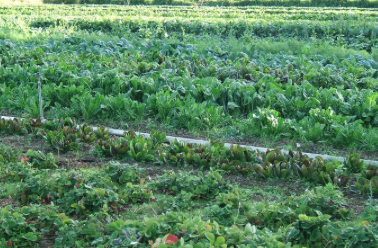
I always recommend this because the temperatures in such places make it ideal for planting herbs. To find out where your tea was grown, check the details on it. Most manufacturers write it down clear as day on the packaging. Don’t see it? Consider digging deeper or skipping to a different brand!
Additives
Something really close to organic farms is additives. Try to restrict yourself to herbal products that refrain from this. This is an especially important consideration for those of us with dietary restrictions (whether because of health, religion, or otherwise).

Some additives that are commonplace with hibiscus tea include caffeine and gluten. If the product you intend to buy does not have any of these additives, then you might be on the right track. Make sure that they have no other ones though! Read the labels thoroughly!
The Reputation of the Manufacturer
Nothing reassures a customer better than a good track record. I have to agree that it also applies when buying hibiscus tea. Really, the reputation of the manufacturer helps you gauge what to expect from the product. The principle that guides me is the longer the years, the better the chances it’ll be fantastic.

However, this might not always be true. Some new manufacturers are pretty good at what they do. However, better safe than sorry! You can also get a good feel for the manufacturer by seeing if they make products in addition to herbal teas. How are those products reviewed? That will help paint a picture for you!
So, here are the three features. I believe you’ll make a better choice putting them into consideration. Still unable to choose properly? My top picks in the next section might just help you do so. Remember, by no means are the showcased brands the ONLY top notch hibiscus teas – however, they are brands that I have thoroughly researched and experienced, making me feel comfortable in suggesting them to the HTH community!
Hibiscus Tea – Top Picks

The first thing that left me impressed was the sheer quantity of this particular hibiscus tea. 200 cups! That’s incredible no matter how you look at it. Just make sure you have a measuring cup so you draw on the hibiscus leaves evenly for each serving – consistency is key!
To make things better, it comes with a really good bag. This bag can also be resealed after use. Can you believe that resealable bags are NOT the norm in the herbal tea industry? Makes no sense to me either! With this feature, you really don’t have to worry about preserving the freshness of the leaves. No use for additives!
This product is also certified by USDA organic. This adds to the fact that the leaves come cut and sifted already. Don’t you just love this one already? Derived from the organic farms of Egypt, it’s very hard to find flaws here!
My Experience

The leaves are pretty good hands down. I also liked the fact that I could experiment a little with it. I mean, if you do your extraction right, you can use it for pretty much everything. Baked foods, shampoo, you name it. This is good just in case you bump up against an expiration date and need to use more hibiscus leaves in a hurry!
It was fantastic brewing hibiscus tea with it. The aroma was just lovely. I also felt it helped improve my mood. I could go on and on here. You’ll probably become bored. So I’ll just leave you with some pros and cons of my experience.
Pros
- USDA organic (an indicator of quality)
- Leaves are grown in Egypt
- Great quantity (don’t have to worry about running out)
- Money is guaranteed if you don’t like it (we don’t think you’ll be asking for a refund).
- Great taste
- Improves mood
- Good storage medium (Resealable bags! Yay!)
Cons
- High demand (a good sign in terms of other user’s opinions of this hibiscus tea)
The manufacturer behind this particular hibiscus tea has been around for quite a while! So, it’s really not a surprise that they have come up with this hibiscus tea of tremendous quality!
This herbal tea comes in 6 packs containing 16 tea bags each. That leaves the grand total at 96. One of the strong passions of their manufacturers is to promote sustainable farming methods. This scores high marks with HTH writers and readers!
This devotion to sustainability and quality shows in many ways. First, this product has been certified by USDA organic as well as Kosher. It’s also devoid of all additives such as caffeine and gluten. It’s a good product in my opinion, especially since its acceptable to nearly every diet!
My Experience

I like its taste. It’s a bit tart and tangy. The sheer quantity of tea bags is also rather appealing. You can brew hibiscus tea all day if you want.
I also noticed a change in my cardio (or, really, my energy level I suppose) since I started it. My steps are lighter and I seem to have more fuel to handle my activities. Here are some pros and cons from my experience.
Pros
- Great Taste (somewhat of a unique twist)
- USDA organic
- Kosher certified
- Great for your cardiovascular system or just your basic levels of energy (without the need for sugary or artificial drinks to boost you along during the day)!
- The reputation of the manufacturer
Cons
- It comes in teabags. Strictly for hibiscus tea (though some view this as “focus” and deem it to be a “pro” instead of a con).
Conclusion

I think we covered all the blind spots, right? So there you have it! Hibiscus tea hallucinations have been dealt with thoroughly. With this guide, I trust you’ll make the right choices. If nothing else, you have learned some of the basics of hibiscus tea and what to look for to make sure you buy the best of the best (when you do make the decision to buy)!
Comments

Did you know about hibiscus tea hallucinations before reading this article? Perhaps you’ve heard the topic being discussed in herbal tea circles? Perhaps you’ve been a long time consumer and have never experienced a hallucination? Or, perhaps you have experienced one very early on in your hibiscus consumption habit? Please share your story with us! We read and reply to every comment and love interacting with the herbal tea community!
